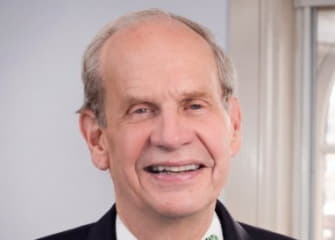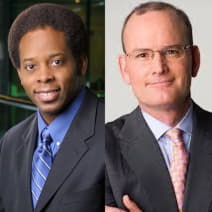
Tom Wilcox
Click here for Part II, Part III & Part IV
Tom Wilcox, 69, will step down from the Baltimore Community Foundation at the end of the year, after 17 years at the helm of the umbrella philanthropic organization that brings together scores of donors and millions of dollars for the welfare of Greater Baltimore.
When Wilcox assumed leadership of the BCF, it gave out grants of $5 million annually. As he readies to exit, that number has grown five-fold to $25 million, while the endowment at its command is inching toward $200 million.
In an interview with DLA Piper’s
Guy Flynn and former Legg Mason CEO Mark Fetting, Wilcox recounts his distinguished stint at the head of “a philanthropic bank,” after nearly two decades in education as head of Concord Academy. “Baltimore boasts of a growing economy, in which all have the opportunity to thrive. It’s about merging economic development with poverty reduction, so that all boats go up, and particularly those people who aren’t yet even swimming necessarily can be fully floating and moving forward,” Wilcox said.
Flynn, a lawyer, is a member of the five-person Baltimore City Board of Ethics and a past chairman of the Maryland State Bar Association’s Real Property Section Discussion Group. Fetting is associated with a variety of charitable and philanthropic work and headed United Way of Central Maryland’s fundraising campaign in 2013.
GUY FLYNN: Most people don’t really know all facets of BCF, including some of us, like me, who are newer trustees. What’s the elevator speech that explains it all?
TOM WILCOX: Well, we’re on the ninth floor with a very slow elevator.
GUY FLYNN: Ha ha ha. I can vouch for it.
TOM WILCOX: We can’t move for that reason, because if it were a New York express elevator, we’d be out of business. Put simply, we are 800 funds or foundations. People understand the Abell Foundation, people understand the KC Foundation. This was a donor who wanted to do some good and left a corpus.
In our case we are many, many, many funds. Rather than being one, it is 800, as I said, and of those 800, about a third involve a working relationship with a living donor who uses us as a partner in his or her philanthropy. About a third serve a special purpose, and about a third are used on a fully discretionary basis by the board, to do good in Baltimore.
On the one hand, we are a philanthropic bank; on the other hand, we are trying to have an impact, one fund on the other. We’re really trying to bring all of that work together to make it all happen. Baltimore boasts of a growing economy, in which all have the opportunity to thrive. It’s about merging economic development with poverty reduction, so that all boats go up, and particularly those people who aren’t yet even swimming necessarily can be fully floating and moving forward. But we are nothing more than a group of philanthropic funds, and we’re, therefore, very complicated administratively. Every fund has its own life, it’s got gifts in, it’s got grants out; it’s got an investment strategy and it’s got people who either advise it or work with it. We work with a huge variety of people.
GUY FLYNN: Can you break that down in terms of stakeholders, who are the various constituencies that BCF serves, for example? And how do you serve it?
TOM WILCOX: Sure. Well, it’s a huge variety of stakeholders and what’s interesting is our history. Whereas the United Way was founded to serve a large variety of nonprofits, so they could speak in one voice to raise money in the corporate community and among their employees and more, serving the nonprofits.
Community foundations were founded to serve donors and they were founded often by banking institutions who wanted to help the trust companies help their donors be as effective in their philanthropy as they were in their private transactions with individuals and families on their wealth. In theory, it starts with a donor and ends with a grantee. But in the case of a community foundation, it’s much more than that because everything is governed by a board and for the people who give the dollars outright. All of the income from dollars that are given to us are allocated by that board. They don’t give this to Tom Wilcox and his colleagues, they give it to you two and your colleagues who then figure out how best to do this.
Donors, board members who oversee, philanthropic partners, people in the community who are doing other things, grantees, we would be useless without our grantees, the general public and particularly in the case of BCF, because we’ve decided that while we administer 800 funds and serve the individual interests of each of those fund holders, we also serve the collective interests of all of those donors.
What can we do to serve their larger interests? We decided that we could be their voice, and indeed to be their voice effectively, we could also be the voice of the community teams. We could become an independent non-partisan voice for Baltimore. In many ways, our constituency is, what Bob Kant, our former board chair and one of the world’s greatest people said, the phone book. Now I guess you’d say the cyber something. But it’s Baltimore. The broad stakeholder is Baltimore and we really are a trust both in terms of being a philanthropic trust and a place where people put their trust and hopes.
GUY FLYNN: Can you quantify for us where BCF stands today in terms of how much is in the civic endowment, what flows in and out on an annual basis, etc.?
TOM WILCOX: Let me start with what flows in and out because we have an interesting anachronism; the commercial charitable gift funds that hold donor advice funds similar to ours measure their success on the size of their assets. We measure our success much more on the impact of our grant-making. In some ways, if I were to be compensated for the amount that assets come and stay, which is what the mission of that is, I’d probably get fired immediately because they don’t stay. We work very hard to help our donors get the money out into the community and actually speak, if we’re going to talk about strategic plan.
Let’s talk about it annually. In the ’90s, BCF granted up to about $5 million a year. Thanks to activating all of these donors in these 800 funds and getting them really engaged in the community, Ted Ebert’s grant-making has gone up to about $25 million a year. So, we’re seeing this really significant surge in grant-making, not necessarily always to our strategic ends, because it’s often responding to a donor’s interest. We’ve seen a great surge there. We only had, in terms of a permanent endowment, in year 2000, about $28 million. Right now, that’s about $115 million and with some pledges that are due, it will end up being between $175-$200 million to the endowment and that’s a really significant change, because these are dollars that will be here and the income will drive change. But the bigger story really is the fact that we raise annually from our donors anywhere from $3-$8 million to support our initiative. Eight million dollars, if you took 5%, would require $160 million in assets. Our core assets are $175 million right now. We have another $110 million in what we call allied assets and we’ll come back to that. We have relationships with private foundations who rely on us for their philanthropy.
Connect with Tom on LinkedIn

Flynn, a lawyer, is a member of the five-person Baltimore City Board of Ethics and a past chairman of the Maryland State Bar Association’s Real Property Section Discussion Group. Fetting is associated with a variety of charitable and philanthropic work and headed United Way of Central Maryland’s fundraising campaign in 2013.


Edwin Warfield, CEO of citybizlist, conducts the CEO Interviews.
If you're interested in reaching CEOs, please contact edwin.warfield@citybuzz.co
Connect on LinkedIn


































